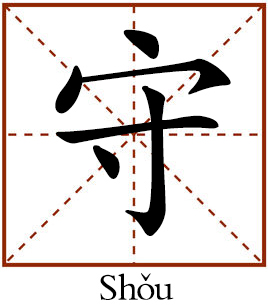Keep

This character means “to keep, abide by,” “to stick to” or “to defend.”
守得云开见月明
shǒu dē yún kāi jiàn yuè míng
Shou means “to stick to and wait” while yun is clouds. Kai means “to clear away” while jian means “to see.” Yue is the moon and ming means “to be bright.” This phrase, taken literally, means “to wait until the clouds clear away and the bright moon appears.” It is a popular Chinese saying, the meaning of which is similar to “Things will work out as long as you don’t give up.” It encourages people to be patient and persistent.
The origin of this saying is uncertain. Some believe that it is derived from the Outlaws of the Marsh, one of the Four Great Classical Novels of Chinese literature, but this hasn’t been verified.
This saying is being used more frequently as the world becomes more profoundly affected by the COVID-19 pandemic. In addition to the threat to public health, economic and social disruption threatens the long-term livelihoods and wellbeing of people in many countries. The bleakness caused by the COVID-19 pandemic is just like when the sky is shadowed by clouds. However, clouds always drift away—just as the saying goes—and the moon will eventually appear. It is only a matter of time. A persistent global effort is needed now and ahead to fight the pandemic.
守株待兔
shǒu zhū dài tù
Shou means “to stand by” and zhu “a tree stump.” Dai means “to wait for” and tu “hares.” This term literally means “to stand by a tree stump waiting for more hares to come.”
This is an idiom derived from a fable from the Hanfeizi, an ancient Chinese text attributed to foundational political philosopher Han Fei (c. 280—233 BCE). “There was a peasant in the state of Song. One day a hare dashed up, knocked against a tree in his field, broke its neck and fell dead. Then the peasant put down his hoe and waited by the tree for another hare to turn up. No more hares appeared, however; but he became the laughing-stock of the state” (trans. Yang Xianyi & Gladys Yang).
Now the idiom is used to satirize those who rigidly adhere to limited experience and refuse to adapt themselves to the changing situation, or those who trust foolishly in chance and luck.
edited by REN GUANHONG

 PRINT
PRINT CLOSE
CLOSE